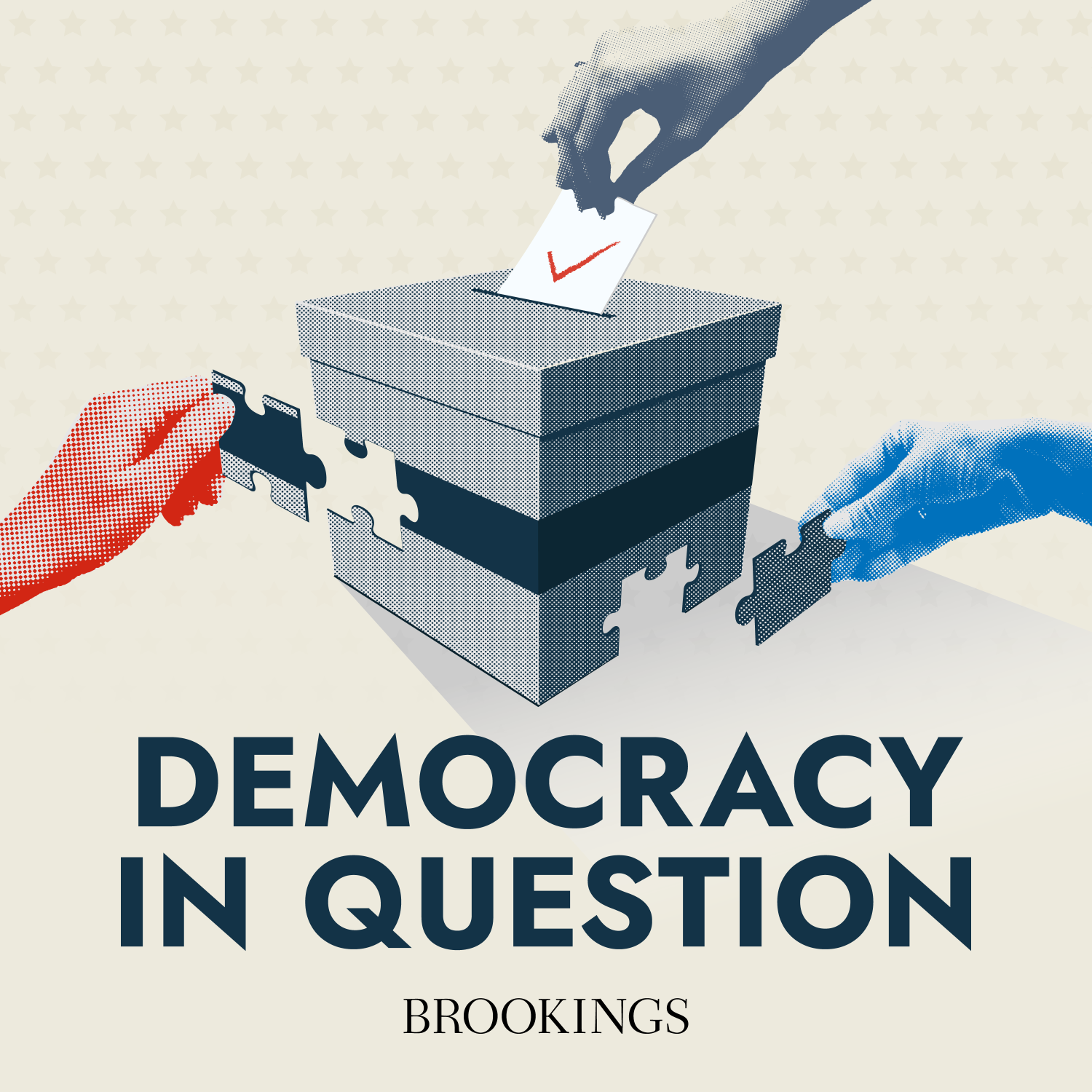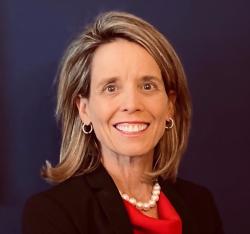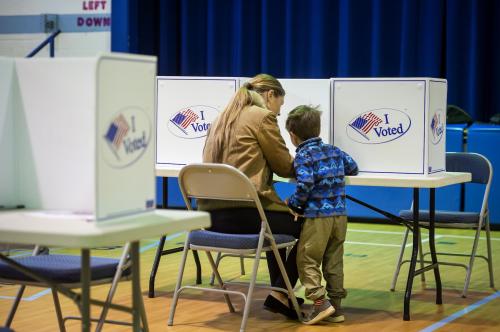... in a typical presidential term, the president might get credit or blame, first of all, because he has taken credit. And it’s always been a he so far. He’s taken credit, and then it seems fair that if you’re going to take the credit, we’re also going to blame you.
Wendy Edelberg
Presidents often get the credit and the blame for the U.S. economy largely because they implement policies that can have immediate and far-reaching effects. In our constitutional design, however, economic influence is shared: Congress holds the power of the purse, determining government spending and taxation, while the Federal Reserve controls interest rates and monetary policy. The economy itself is a complex, ever-evolving system that operates beyond the influence of any single administration. On this episode, host Katie Dunn Tenpas and economist Wendy Edelberg, a senior fellow in Economic Studies, look at President Trump’s latest actions—from across-the-board tariffs to aggressive downsizing of the federal workforce and programs—and examine whether new levels of uncertainty could have long-lasting economic consequences.
- Listen to Democracy in Question on Apple, Spotify, or wherever you like to get podcasts.
- Watch episodes on YouTube.
- Learn about other Brookings podcasts from the Brookings Podcast Network.
- Sign up for the podcasts newsletter for occasional updates on featured episodes and new shows.
- Send feedback email to [email protected].
Transcript
[music]
TENPAS: Hi, I’m Katie Dunn Tenpas, a visiting fellow in Governance Studies at the Brookings Institution and the director of the Katzmann Initiative on Improving Interbranch Relations and Government. And this is Democracy in Question, a podcast where we examine current events through the lens of America’s political foundations, thinking about how recent events fit into the broader stream of democracy that runs throughout our history. You can find episodes of this podcast at Brookings dot edu slash DemocracyInQuestion, all one word.
Today, we’re diving into the question, why does the president get the credit and the blame for the economy? According to the U.S. Constitution, Congress holds the most specific economic powers. It controls taxing, spending, and regulating commerce. While the president can influence policy directions and consumer confidence, he theoretically needs Congress to enact legislation that can influence economic activity. Think tax cut legislation, the budget plan, or even laws like the infrastructure bill passed during the Biden administration.
The Federal Reserve, though not mentioned in the Constitution, also plays a major role in the economy by independently managing monetary policy through setting interest rates. Private markets, global events, and consumer behavior are also important factors in the state of our economy.
Now, just a few months into Trump’s second term, we’ve already seen major moves, especially around trade and tariffs. His new policies have shaken global markets, intensified tensions with China, and raised big questions about who’s really calling the economic shots, and what means for American wallets and for democracy.
To help make sense of all of this, I’m thrilled to be joined by Wendy Edelberg, a macroeconomist and senior fellow in the Economic Studies program at Brookings. In her work, Wendy dives deep into everything from household spending and saving, to fiscal policy and financial system risks. She’s the perfect person to help us untangle what’s happening now and what it means moving forward.
Wendy, welcome and thank you for joining me.
EDELBERG: I am so glad to be here. I’m worried you’ve given me too difficult of a task, however. Untangling is going to be hard.
TENPAS: Yeah, we’ll get there, we’ll get there. I’m sure that listeners will know a lot more by the end of this program. So let’s start off with the basic question of this episode, which is why does the president get the credit and the blame for the economy?
[2:43]
EDELBERG: Well, let’s first rewind back before Trump became president for the second time. And I would say in a in a typical presidential term, the president might get credit or blame, first of all, because he has taken credit. And it’s always been a he so far. He’s taken credit, and then it seems fair that if you’re going to take the credit, we’re also going to blame you.
But it’s absurd to think that the economy starts and stops with presidential terms. It’s in fact even absurd to think that the economy starts and stops with congressional terms. Even as you described it as you were opening us up, that Congress is really the actor that can pass consequential legislation that really does sometimes have big economic effects. But it’s still more complicated than thinking this economic effect can be pinned to January 2013 or January 2009. There was an economy before those dates and an economy after those dates.
TENPAS: And the economy is like a river. It keeps flowing regardless of who the occupant of the White House is. And there’s so many factors affecting it, right?
[3:57]
EDELBERG: Yeah, except let’s now fast forward to now. And this is a different can of worms. I really would lay the blame for many of the gyrations that we’re seeing now at Trump’s feet. Trump has been the source of power behind the lurching in tariff policy that has just enormous economic effects. I think he has also been the driving force behind immigration policy, which is having some economic effect now, but will have more, I think, of an economic effect going forward. And he also unleashed Elon Musk and DOGE on the federal government, which I also think will have an economic effect.
And those really are things that I can very specifically say came from President Trump and I think will have very clear economic effects that begin this year in 2025 and will be very clearly changing the trajectory of where our economy is going for the next few years and maybe beyond.
TENPAS: So in this particular instance, it is clear why presidents get the credit and the blame because they initiate policies that have a profound immediate effect on the economy.
[5:18]
EDELBERG: Yeah, it’s hard for me to put Trump in a broader category. If I were a better economic historian, I’d be able to say, oh, he’s actually a lot like McKinley. But I don’t know if he’s a lot McKinlay or a lot like Nixon. He is certainly not like recent presidents. So it’s harder for me say they. It feels like we are in a really unique time for the incredibly consequential actions that the president is taking with regards to the economy.
TENPAS: Right. And just as a casual observer who’s not an economist—maybe I’m a little more than a casual observer because I’m political scientist—but when he came out very strongly in favor of tariffs across the board and at very enormous high rates, I thought to myself, if tariffs had been an answer to trade deficits, wouldn’t we, or wouldn’t a president have done that a long time ago?
[6:13]
EDELBERG: Across-the-board tariffs are terrible policy. It’s basically impossible to come up with a rigorous justification for a 10% across-the-board tariff. And there was a huge amount of research that came out before Trump became president warning against putting in place these sorts of tariffs.
However, what I’m about to say is super important for what I think has been the consequences of the tariff policy that Trump has unleashed. What he has really created is tariff policy uncertainty. When I talk about that big body of research that came out before Trump became president and came out early in his presidency, a lot of that was about this is how we think the economy would unfold, if, let’s say 10% across-the-board tariffs got put in place and stayed there and were credibly going to stay there.
And what that research suggested is there’s a certain incidence of tariffs, which is to say sometimes those tariffs are effectively at the end of the day going to be paid by consumers, some of them are going to paid by businesses, some are going be paid by the foreign exporters. We thought hard about what that incidence was, what that meant for inflation, what that mean for the economy. And those effects were negative overall for the economy, meant higher inflation. We could write all of that stuff down.
But all of that is being swamped by the negative economic effects that we are now seeing from uncertainty. So I don’t want people to think that as bad as 10% across-the-board tariffs are, the negative economic effects that we’ve seen, you know, since the end of March from Trump’s tariff policies, this is only partly because of the tariff policies. This is I actually think more because President Trump can’t seem to make up his mind of what he wants tariff policy to be, and that is creating, I mean, true chaos in financial markets, for firms, and ultimately it will create chaos for households.
TENPAS: And just to bring it down to sort of a micro level, let’s say you’re an American exporter, what are you thinking right now? And how has this month been for you?
[8:37]
EDELBERG: Oh, my goodness. I can’t even imagine. So what you’re thinking is if you’re an American exporter, let’s assume that you’re exporting a good. That probably means you are making that good in the United States, stands to reason. Some part of the inputs that you need to make that good are imported. That’s a part of the effect of tariffs that a lot of people don’t think about, that even somebody who’s exporting is actually affected by tariffs on imports. So if you’re an exporter, you are first and foremost right now probably thinking, how much have my costs gone up because of tariffs on imports? Or how much might my costs go up in the future if new tariffs are put in place?
And then you’re thinking, are other countries that I’m exporting to going to put retaliatory tariffs on me? Canada has threatened in all sorts of respects, China has threatened in all sort of respects, of putting in place retaliatory tariffs that will make it harder for American exporters to convince foreigners to buy their goods.
And so, you’re probably wishing that none of this craziness in tariff policy had ever happened. But at the very least, even less less wishful thinking than that, you’d wish that Trump would just commit to a particular tariff policy and then promise not to change it. Because as bad as that world would be, if your imports were more costly to make your good and other countries retaliated, and that changed how much demand you saw from foreigners, at least then you could make plans and organize how you were going to run your business.
And so, yeah, if you really had a magic wand, you’d wish none of this had happened. But more realistically, you’d wish that Trump would just commit to a future policy. But completely realistically, you’re probably realizing that 2025 is gonna be a really bad year for your business.
TENPAS: And tying this back to the overall theme of the podcast, which is democracy, it strikes me that something’s out of balance, because I don’t recall a period in American history where a president has been able to exert so much influence and power over the economy and create such uncertainty. Can you talk about that?
[11:17]
EDELBERG: Yeah, so I’m a little outside my lane here because I am consuming the research on how he’s been able to do this that other people in other fields, political scientists, are writing. But first and foremost, you would expect Congress to step up and say, hey, Mr. President, we have the power of the purse, you don’t have these prerogatives, and we’re going to pass legislation to stop you.
So take as just a very concrete example, some of the actions taken by DOGE. And Congress passes appropriations laws. Congress says we want the U.S. Treasury to send a certain amount of money to USAID to fund the following programs. That is the kind of thing that will be in a piece of legislation that Congress has passed. President signed it, but Congress enacted it. And President Trump through DOGE is basically saying, I don’t care that you passed that appropriation bill and enacted that into law. We’re not gonna send that money to USAID, and indeed I’m gonna put somebody in place to run USAID who’s not even gonna ask for that money.
TENPAS: Right, so it’s impoundment?
EDELBERG: Yes, it’s impoundment. You would expect Congress to cry foul, and we don’t really have a system that’s well-designed for what to do when Congress rolls over. Our system is well-designed for the branches of government to be checks and balances on each other. Well, Congress is neither checking nor balancing.
So then you say, okay, well, maybe the courts will be the check and balance, and certainly there’s a slew of lawsuits out there. We will see, we will see what happens. Courts have historically been quite deferential to the executive branch for the kinds of actions that Trump is taking.
And moreover, what President Trump is doing, if he loses in one dimension, he just moves on into another dimension and he, you know, tries to exert his power in a different sphere. So it’s a bit of a whack-a-mole when it comes to the checks and balances of the courts. The real tragedy here is that Congress is letting this happen.
TENPAS: And will all the flip-flopping on these tariffs, will that have long-term consequences on our economy, or is it all very short-term?
[13:43]
EDELBERG: Well, it depends on what your definition of long-term is. I suspect that the damage that tariff policy uncertainty has done is, at this point, irreversible for what it means for firms’ plans for investment as long as Trump is president. If you were a firm trying to figure out whether or not you wanted to expand your business, hire more people, and put on an extra shift at the factory, and you were trying to find out what the economy was gonna look like over the next year, you are probably deciding to take a pause right now until you get certainty. If you can pause, you probably are pausing.
And that will be the story until Trump gives certainty. In the moments when President Trump says, I’m backing off from my tariff threats, I am only going to put this tariff on and maybe not that tariff—even in those moments where he’s backing off and that maybe makes the environment a little less painful for importers and exporters, you still have the same uncertainty about what the environment is going to be three months from now, six months from, nine months from now, 12 months from.
And that pause in investment that I think we are inevitably going to start seeing in the data is the kind of thing that causes a recession. I said it, I used the R word, recession. I am now terribly worried about a recession and a recession caused by investment cratering.
TENPAS: It also seems like in this early stage, too, that just the hesitation on behalf of these firms has ripple effects in terms of the labor market and other aspects. Could you talk about that, how it just, it’s not just these firms per se, the economic impact is everywhere?
[15:47]
EDELBERG: Yeah. So, you know, you have a small grocery store in a town that has been expanding over the last few years, and you had put in place plans to do a major renovation of your grocery store and expand and hire 10 more people. And it was all in place and now you’re terribly worried. You’re terribly worried about food costs. You’re terrible worried about whether or not the massive reductions in in immigration mean less demand for your stuff. And you’re worried about whether or not the price of the refrigerator that you were going to put in, you know, replacing your old refrigerator in the back of the grocery store is now going to be more expensive because of import tariffs.
For all of those reasons, you might say, you know what? Let’s pause. And what that means is that those 10 workers who you planned to hire are now not going to get hired. And now, what about the company that was going to sell you your new refrigerator? Well, that company now it has less demand for its stuff that it was going sell. So maybe it lays somebody off.
And this is how recessions start. It starts to pick up its own negative momentum because those people who now no longer see demand for their skills as workers don’t spend as much money as they were going to.
TENPAS: And there’s probably a lot of belt tightening that’s happening.
EDELBERG: There’s a lot. I want to be clear; I think the belt tightening is a little down the road. And in fact I think that there’s a chance that we will continue to see strength in consumer spending for a couple of months as consumers quite reasonably and rationally try to get ahead of any tariffs that might get put in place. And I think it’s going to take a little while for the labor market to soften. And for a time, the labor market will stay strong. And so incomes will stay, will stay strong.
And so I think we may see a couple of months of relatively strong consumer spending, even as investment, as I fear, craters. But then ultimately, yes, this will hit, families’ pocketbooks, and they will have to pull back on their spending just to make ends meet.
TENPAS: And as an economist prior to January 20th, 2025, what would you have identified as the most significant economic problems in America at the time? Because I know a lot of people are really concerned about the budget deficit skyrocketing. It seems to me that tariffs might not have been the best priority for a new president, that there are other sort of issues. We were dealing with the period of resisting inflation. Like, from an economist’s perspective, what was on your mind in terms of if you had had the opportunity to advise an incoming president what would you have advised them to focus on?
[18:38]
EDELBERG: Aw, geez. I think to answer your question and not be, like, exasperated and glib about it, I have to go back before January 2025 and think, you know, what would I have advised a president six months ago, eight months ago? You mentioned the budget deficit. I am super frustrated that we seem as a country to demand all sorts of goods and services from our federal government, but then refuse to tax ourselves to pay for those goods and services. And I think that the budget deficit crowds out resources that should be available for private investment and makes our economy smaller.
Okay, that said, I don’t think the budget deficit is our biggest problem, even as it to some degree, makes our economy smaller. I worry about how little we invest in children. I worry that we are a really rich country with too many children in poverty, and I think that that’s offensive. I worry that it is too challenging for parents with young children to find high quality affordable childcare and work outside the home if they want to. I worry that our immigration policy is the height of absurdity, and I would want to bring a lot of rationality to that process. I worry that our electrical grid is woefully inadequate to the job at hand and is nowhere near where needs to be for our transition to greener energy. And that’s a difficult problem. It’s going to take significant coordination.
I mean, I can go on and on and on for the things that if we had policymakers in the House, in the Senate, in the presidency that were really thinking about the long-term health of the country and, like, had, you know, the wherewithal to make hard decisions to make our world better, like I’m not saying that these are easy fixes.
TENPAS: I just was thinking like broadly as a macroeconomist, what are the things that maybe should have been more prioritized in terms of thinking about how to keep the economy healthy?
EDELBERG: I mean, I would say just my more glib answer is first do no harm. Like, don’t threaten 50% tariffs on some of our closest trading partners, and then 36 hours say, oops, take back. It’s painfully bad economic policy.
TENPAS: We talked about how Congress needs to play its part; the courts need to play it’s part. But I’m also thinking about public opinion. And I’m wondering if public opinion actually is what influenced him, particularly from wealthier donors, influenced him to push the pause button.
I was just thinking that maybe another check on the presidency could be public opinion and if it changes in a way that’s adverse to his standing, then maybe he would change his mind.
[21:41]
EDELBERG: Oh, I absolutely think that if public opinion turned in a significant way, that that would be a restraining influence on the president. I absolutely believe that. And I think the president probably feels quite empowered by the fact that at least as of mid-April, 47% of the country were looking at what he was doing and saying, thumbs up, we want more of that.
I’m sympathetic. I appreciate that a lot of people are looking at what he’s doing and saying how fantastic that he’s knocking heads together and that he is actually at least doing something. And, you know, I’m just sympathetic to just wanting a president to, for Pete’s sake, do something. But I think what he’s doing is detrimental to the long-term health of our economy, our country, absolutely certainly to the long-term health of the federal government. And I leave it to people like you to tell me whether or not public sentiment will really turn against him.
TENPAS: And typically I close the podcast episode by asking you to imagine yourself as a high school teacher and you’re teaching your students about democracy and the economy and its relationship. What’s one lesson that you might want to leave them with?
[22:53]
EDELBERG: All right. I’m not going to be optimistic here, so just bear with me. I believe in the social contract. I believe that we are in this together as a country. And the only way that works is if we support policies that are better for the broader good, while we appreciate that they are not always the best for us. What I am trying to say is, give up on the idea that every policy should be a win-win.
We are in a government together, we are citizens together, and not every policy, not every decision, is going to benefit you individually, and that’s, it’s not realistic, and a politician who tries to sell you that is selling you a falsehood.
One of the most basic concepts in economics, that anybody who shops at a store, anybody who works for a living, anybody who has a checking account, which is to say, I’m assuming, every single one of your listeners, a basic economic policy that you should understand is incidence. So what that means is that if, for example, a tax is put in place, like let’s say, just hypothetically, a tariff is put place, to make that policy go, logistically, someone is actually going to have to pay the tariff. So an importer pays the tariff. They are the ones who literally write the check to the government to pay the tariff, it is the U.S. company that is importing the good. They pay the tariff.
Incidence tells us who really bears the burden of paying that tariff. If when the importer has to pay that tariff to the government, they simply turn around and charge me, the consumer, a higher price and I reach into my pocket and pay a higher price for that good, and then the importer says, thank you so much for giving me that extra money, and they turn around and give that extra money to the government, they have still been the ones to literally write the check to the government, but I as the consumer when you raised my price and I paid it? I’m the one who beared the burden of it.
The same is true when you pay sales tax at the grocery store. The same is true when you pay a payroll tax to the government.
Ultimately, things will shake out depending on how willing I am as a consumer, let’s say, to pay a higher price for a good, how willing you are as a firm to sell the good to me at a lower price, how willing you are as a landlord to charge me a lower rent. All of these things will shake out in the marketplace to figure out who is ultimately bearing the burden.
And so don’t be fooled when you go to the grocery store, and you pay the sales tax for all the items that you put in your cart. Yes, you are literally paying the sales tax, but to some degree the grocery store has felt compelled to lower the price so that you’ll continue to shop at the grocery store. And to some degree, the grocery store is also bearing the burden of paying that sales tax. So don’t be fooled by thinking that literally the person who writes the check to the government is the only one who bears the burden.
TENPAS: So the idea is that it’s a shared burden, incidence is a shared burden.
EDELBERG: Yes.
[music]
TENPAS: Thank you so much. You’re teaching me a lot. I appreciate it.
EDELBERG: You’re welcome.
TENPAS: Democracy in Question is a production of the Brookings Podcast Network. Thank you for listening. And thank you to my guests for sharing their time and expertise on this podcast.
Also, thanks to the team that makes this podcast possible, including Fred Dews, producer; Daniel Morales, video manager; Steve Cameron, audio engineer; the team in Governance Studies including associate producer Adelle Patten, plus Antonio Saadipour and Tara Moulson; and our government affairs and promotion colleagues in the Office of Communications at Brookings. Shavanthi Mendis designed the beautiful logo and show art.
You can find episodes of Democracy in Question wherever you like to get your podcasts and learn more about the show on our website at Brookings dot edu slash Democracy in Question, all one word.
I’m Katie Dunn Tenpas. Thank you for listening.
The Brookings Institution is committed to quality, independence, and impact.
We are supported by a diverse array of funders. In line with our values and policies, each Brookings publication represents the sole views of its author(s).







Commentary
PodcastWhy does the president get the credit and the blame for the economy?
Listen on
Democracy in Question
April 24, 2025